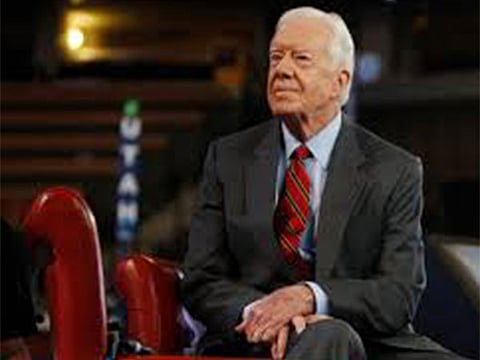Jimmy Carter's enduring legacy of global compassion
From one-term president to Nobel laureate, Carter redefined leadership through service

In the pantheon of American presidents, few have experienced a post-presidency as transformative and impactful as Jimmy Carter. Serving as the 39th President of the United States from 1977 to 1981, Carter’s tenure in the Oval Office was marked by significant achievements but also challenges that contributed to his reelection defeat.
Yet, it is in his post-presidency years that Carter truly distinguished himself, earning global admiration as a tireless advocate for peace, democracy, and human rights. His journey from a one-term president to a revered global statesman is a testament to his enduring commitment to service and the profound impact an individual can have beyond political office.
Carter passed away on Dec. 29, 2024, at the age of 100, leaving behind a legacy of compassion and service that will continue to inspire generations.
Jimmy Carter’s presidency was a complex period in American history. Elected in the wake of the Watergate scandal, Carter promised honesty, transparency, and a renewed sense of moral leadership.
His administration achieved significant milestones, including the Camp David Accords, a landmark peace agreement between Egypt and Israel; the Panama Canal Treaties; and the establishment of the Department of Energy and the Department of Education.
Carter formalised relations with the PRC, acknowledged the “one China” policy, and supported Taiwan unofficially, balancing congressional backlash with strategic diplomacy. He also emphasised environmental conservation, energy independence, and human rights as cornerstones of his foreign and domestic policies.
However, Carter faced considerable challenges, including a struggling economy plagued by stagflation, an energy crisis, and the Iran hostage crisis, which overshadowed many of his achievements.
His inability to navigate these crises effectively in the eyes of the public contributed to his loss to Ronald Reagan in the 1980 election. Despite leaving office with low approval ratings, Carter’s resolve to make a positive difference in the world remained unshaken.
After leaving the White House, Carter established The Carter Center in 1982, a non-governmental organisation dedicated to advancing human rights and alleviating human suffering.
Based in Atlanta, Georgia, the Center became the cornerstone of Carter’s global statesmanship, focusing on promoting democracy, resolving conflicts, and improving public health worldwide. This endeavour marked the beginning of a new chapter in Carter’s life, one defined by humanitarian work and international diplomacy.
One of The Carter Center’s most notable achievements has been its work in monitoring elections around the world. Under Carter’s leadership, the Center has observed at least 124 elections in 40 nations across Africa, Latin America, and Asia, ensuring free and fair electoral processes. This commitment to democracy has not only bolstered trust in electoral systems but has also empowered citizens in emerging democracies to shape their own futures.
Carter’s efforts in conflict resolution have been equally remarkable. Drawing on his experience as a negotiator during the Camp David Accords, he has mediated disputes in some of the world’s most volatile regions. From brokering peace agreements between Ethiopia and Eritrea to facilitating dialogue with North Korea, Carter’s interventions have often provided a critical channel for diplomacy where traditional state mechanisms faltered.
Perhaps one of his most enduring legacies in peacebuilding is his dedication to addressing the Israeli-Palestinian conflict. Carter’s 2006 book, Palestine: Peace Not Apartheid, sparked controversy but also underscored his unwavering belief in the need for a just resolution to the conflict. His willingness to engage with all parties, including those ostracised by the international community, reflects his commitment to inclusive dialogue as the foundation for lasting peace.
Beyond his work in democracy and peacebuilding, Carter has been a relentless advocate for global health and development. Under his leadership, The Carter Center spearheaded initiatives to combat neglected tropical diseases, including the Guinea worm eradication program. When the Center began its efforts in 1986, there were an estimated 3.5 million cases of Guinea worm disease annually. Today, that number has been reduced to fewer than a dozen, making it one of the most successful eradication campaigns in history.
Carter has also championed efforts to fight malaria, river blindness, and trachoma, partnering with governments, international organisations, and local communities to bring life-saving interventions to millions. His approach — grounded in collaboration and respect for local cultures — has been a model for sustainable development practices.
What sets Carter apart as a global statesman is his unwavering moral compass. Guided by his deep Christian faith, Carter’s commitment to social justice, humility, and service has been the bedrock of his work. His decision to live modestly, even after leaving the presidency, and his hands-on involvement in initiatives like Habitat for Humanity — building, renovating or repairing homes for the underprivileged well into his 90s — speak to his authenticity and dedication.
Carter’s humility and resilience allowed him to weather criticism with grace. Despite the polarising reception of some of his positions, particularly on the Israeli-Palestinian conflict, he remained steadfast in his belief that peace requires courage, honesty, and a willingness to challenge the status quo.
Jimmy Carter’s contributions to peace and development earned him numerous accolades, including the Nobel Peace Prize in 2002. The award recognised not only his efforts during his presidency but also his decades-long commitment to conflict resolution, human rights, and public health. In receiving the prize, Carter joined a select group of individuals whose impact transcends borders and generations.
Carter’s legacy as a global statesman is perhaps most evident in the lives he has touched. From villagers in remote African communities freed from the scourge of disease to citizens in fragile democracies empowered to vote, his work has brought hope and dignity to millions.
His example underscores the idea that leadership is not confined to political office but can manifest in myriad ways, driven by a passion for service and a vision for a better world.
Sign up for the Daily Briefing
Get the latest news and updates straight to your inbox




